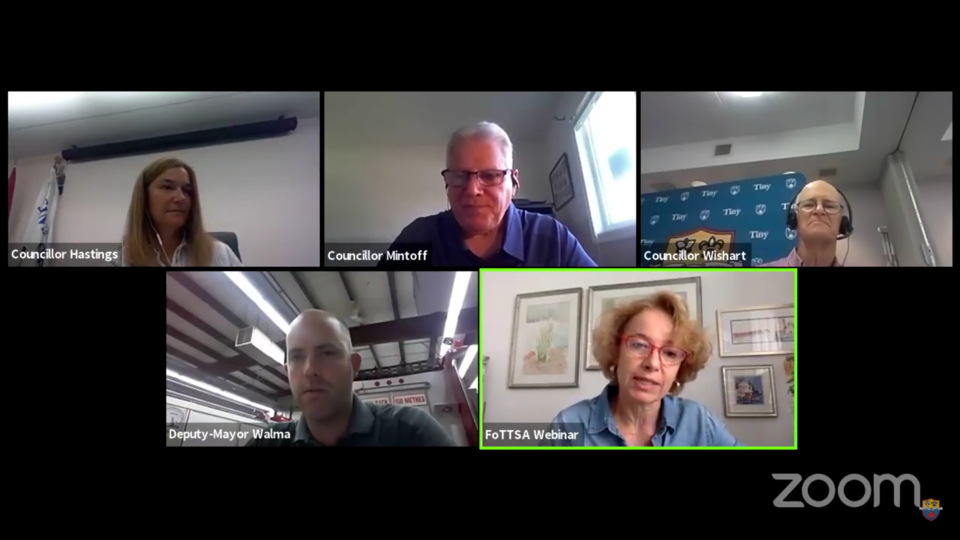Disappointed Tiny residents will try to make the best of the situation when it comes to handling next year's gypsy moth infestation.
Those were the sentiments of Lynne Archibald, secretary of Federation of Tiny Township Shoreline Associations (FoTTSA), as she talked to MidlandToday about council’s decision to not go with aerial spraying as a remedy for the situation.
The FoTTSA member had brought to council the results of a township-wide survey conducted around how residents were feeling about tree defoliation due to the gypsy moth.
During her presentation, Archibald asked council consider an aerial spray program to help out its residents.
But at a recent meeting, council heard staff’s case against the remedy.
“We have 85,000 acres of real estate and we're hearing prices of $500 per acre for spraying,” said Tim Leitch, director of public works/interim chief administrative officer. “If we look at township-wide spraying, we're looking at $40 million, and 10% of the land could be up to $4 million to spray.”
The price tag didn’t intimidate Archibald at all.
“We understand the financial question,” she said. “But there are so many other options than saying, it will cost the advertised price per acre multiplied by the acres we have. Most of the sprayers have very negotiable prices and associations would be more than willing to partner with council and to look at ways of cost sharing.”
Archibald said a better estimate could have been obtained using the latest defoliation map created by the Ministry of Natural Resources and Forestry available on the Simcoe County website.
“I would love to see a more detailed map, but even the one that is available shows that Tiny Township is hard hit,” she said. “It shows what residents have been saying since 2019 has borne out. It was unfortunate council didn't look at that or staff didn't bring it to council's attention."
One again, she reiterated that her research showed that BTk is not harmful to humans.
“And people know this is not a new thing,” she said, talking about Bacillus thuringiensis, a bacterium found naturally in the soil. It is known to cause illness in many insect larvae, including caterpillars of pest species such as gypsy moth, spruce budworm and cabbage looper. “It's been done in many places in Ontario and North America.”
Archibald’s case is backed by County of Simcoe Forestry department’s letter to the township.
“For larger landowners and groups of landowners, the aerial application of BTk is a safe and effective option to reduce defoliation and other impacts until the outbreak collapses,” says the letter, adding, “From a cost/benefit perspective however, a large scale municipal spray program is not warranted.”
As a compromise of sorts, staff is offering relief from overspray affecting municipal property and is proposing a policy to be put together to ensure that all safety and personal property wishes are respected.
“I don't think we should be creating barriers for residents to spray their own property,” said Coun. Tony Mintoff. “I contacted an aerial spray company and asked about their requirements for a buffer zone. They said they will not spray unless the neighbour signs off, regardless of what the municipality says.”
He said he didn’t believe the township should be worried about monitoring or developing a policy.
“Let the neighbours deal with it on their own,” said Mintoff. “If I can't get my neighbour to sign off, then I guess I'm not spraying my property.”
He had some support from the mayor, who agreed that a policy was needed but maybe only for municipally-owned property.
“I don't think we need to get into protecting the neighbour,” said George Cornell. “That's between the spray company and the property owner.”
His deputy was in the opposite court.
“I'm supportive of (the staff) option, but I absolutely want the policies left in,” said Deputy Mayor Steffen Walma. “You can always find differing opinions. I agree that we need to give our residents the ability to spray if they so choose, but I definitely want that policy in place.”
Archibald said FoTTSA will await the exact policy and resolution by council before it’s shared with its members and with Tiny residents at-large through its various digital and print communications.
Her association, she added, will not be conducting any kind of spray program, but would be happy to connect residents to resources around the solution.



